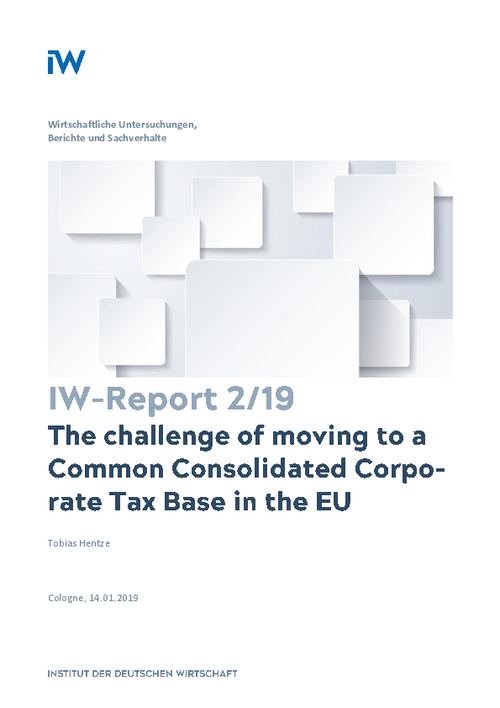International tax competition has been an emerging issue for years. There are various political approaches to agree on common standards on a supranational level. In 2013, the OECD presented a first draft of its action plan against Base Erosion and Profit Shifting (BEPS), which has been eventually finalized.

The challenge of moving to a Common Consolidated Corporate Tax Base in the EU
IW Report

International tax competition has been an emerging issue for years. There are various political approaches to agree on common standards on a supranational level. In 2013, the OECD presented a first draft of its action plan against Base Erosion and Profit Shifting (BEPS), which has been eventually finalized.
The final report was published in 2015. Based on the OECD outcome, the European Commission (EC) launched a renewed proposal of a Common Consolidated Corporate Tax Base (CCCTB) in October 2016. When in 2011 the EC had originally presented the idea of a CCCTB, it was was lacking political support. This time, things might be different. Especially, the governments of France and Germany have reintroduced their idea of harmonizing their corporate tax law (BMF, 2018a).
The EC splits its renewed proposal into two stages. In a first step, a Common Corporate Tax Base (CCTB) shall be ratified by the member states, i.e. without any consolidation of profits. Subsequently, the consolidation of the CCTB shall be amended. For Multinational Enterprises (MNE) with an aggregated turnover of at least 750 million Euro, the application of the CCCTB is supposed to be obligatory.
The proposal focuses on harmonizing the accounting rules and hence the tax base. This shall be achieved by setting up common depreciation rules and, then, applying a profit split to allocate multinationals’ profits to the countries involved. However, the initiative does not consider the harmonization of tax rates.
Compared to the prior approach in 2011, the concept has been essentially changed. A remarkable modification refers to pension allowances. The renewed proposal cedes the tax rules in this regard to the member states and resigns the determination of a fixed discount rate. Furthermore, the EC initiative addresses new issues which have not been included in the previous attempt. First, the preferential tax treatment of debt is challenged by the EC since this debt bias might distort investment decisions. Second, R&D incentives are regarded as crucial to boost innovation. Therefore, a common approach within the European Union (EU) is recommended to establish a level playing field.
There are still significant obstacles on the path to a harmonized corporate tax regime in the EU. The EC initiative would rather be a revolution than a reform in international tax matters. The impact on the distribution of tax revenue could be therefore significant. As tax regulation requires unanimity in the EU, changes are hard to achieve.

Tobias Hentze: The challenge of moving to a Common Consolidated Corporate Tax Base in the EU
IW Report


Haushalt 2025: „Die Ampelregierung blendet völlig aus, dass wir 2045 klimaneutral werden wollen“
Ist der neue Haushalt der Bundesregierung zukunftsfähig? Im Handelsblatt-Podcast „Economic Challenges“ enthüllen IW-Direktor Michael Hüther und HRI-Präsident Bert Rürup, warum der Haushaltskompromiss der Ampelkoalition für 2025 zentrale Probleme wie ...
IW
Haushaltseinigung: Kein Problem wirklich gelöst
Nach langem Streit hat die Bundesregierung sich heute auf einen Haushaltsrahmen für 2025 geeinigt – und vor lauter Streit die eigentlichen Herausforderungen übersehen, schreibt IW-Direktor Michael Hüther in einem Gastbeitrag für ZEIT online.
IW